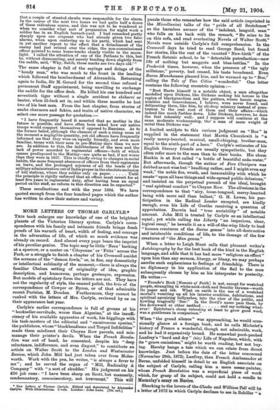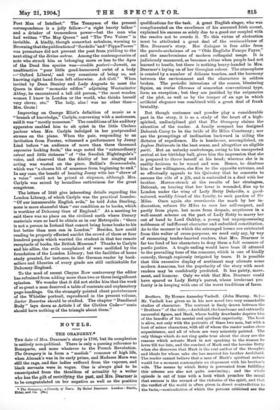MORE LETTERS OF THOMAS CARLYLE.* THIS book enlarges our knowledge
of one of the brightest planets of the Victorian literary system. Carlyle's corre- spondence with his family and intimate friends brings fresh proofs of his warmth of heart, width of feeling, and courage in the adversities of life, of which so much evidence was already on record. And almost every page bears the imprint of his peculiar genius. The topic may be little ' Nero ' barking at a sparrow, or a canter on Citoyenne ' or 'Fritz' across the Park, or a struggle to finish a chapter of his Cromwell amidst the screams of the "demon fowls," or, in fine, any domesticity or intellectual sublimity of the moment,—there is always the familiar Chelsea setting of originality of idea, graphic description, and humorous, perhaps grotesque, expression. But models of epistolary form the letters are not. They have not the regularity of style, the enamel polish, the brio of the correspondence of Cowper or Byron, or of that admirable recent Parisian, M. Doudan. Furthermore, they cannot be ranked with the letters of Mrs. Carlyle, reviewed by us on their appearance last year.
Carlyle's earlier correspondence is full of groans at his "bookseller-servitude, worse than Algerine," at the insuffi- ciency of his available apparatus of work, his higglings with his task-masters of the editorial and "carnivorous species," the publishers, whose " blockheadisms and Torpid Infidelities" made them misdirect their Cheyne Row parcels, and mis- manage their printer's devils. When the French Revolu- tion was out of hand, he consented, despite his "deep reluctance, indifference, and even disgust," to contribute an article on Walter Scott to the London and Westminster Review, which John Mill had just taken over from Moles- worth. Work with the pen, he writes, "is always a fever to me " ; and he served the organ of "Mill, Radicality Company" with "a sort of shudder." His judgment on his £50 job runs : "I have been sharp on Scott, but mannerly, condemnatory, commiseratory, not irreverent." This will • Him Letters of Thomas Carlyle. Edited and Annotated by Alexander Carlyle. With Ehuitrations. 2 vols. London : John Lane. [25s. net.] puzzle those who remember how the said article (reprinted in the Miscellanies) talks of the "pride of all Scotchmen " as the harmless amuser of the "indolent, languid, man" who falls on his back with the remark, "Be mine to lie on this sofa, and read everlasting Novels of Walter Scott." Novels were outside Carlyle's full comprehension. In the Cromwell days he tried to read George Sand, but found her stories, like the rest of the vaunted "New-birth" of the French Satanic school, to be "detestable putrefaction—new life of nothing but maggots and blue-bottles." In the Frederick times, however, when the pressure of "the ugly millstone," poverty, had ceased, his taste broadened. Even Baron Munchausen pleased him, and he warmed up to " Boz," calling the Tale of Two Cities "wonderful." One letter contains the following eccentric opinion :— "Bret Harts himself is a notable object, a man altogether modelled upon Dickens, like Dickens seeking his heroes in the region of blackguardism and the gutters, where heroic magna- nimities and benevolences, I believe, were never found, and delineating them, like him, by ell-deep mimicry instead of pene- tration to the real root of them and their affairs—which indeed lies much further down. Like Dickens, however, he does the feat tolerably well : and I suppose will continue at the same moderate workmanship, tho' a man of more weight of metal than Dickens was."
A limited antidote to this curious judgment on " Boz " is supplied in the statement that Martin Chuzzlewit is "a really merry-hearted, musical, small-chirping, brother-man, equal to the ninth-part of a hero." Carlyle's estimates of his English literary friends are usually sympathetic, but they often refer more to the men than to their books. His chum Ruskin is at first called "a bottle of beautiful soda-water." But afterwards, though the author of Fors Clavigera was dubbed as not wise but "headlong rather, and I might even say weak," the noble fire, wrath, and inexorability with which he smote " upon all base things and wide-spread public delusions," and insisted on the perpetual pursuit of the ideal, brought "real spiritual comfort" to Cheyne Row. The allusions in the correspondence to that " ahT, loose-tongued, merry-hearted being with more sail than ballast," G. H. Lewes, his par- ticipation in the Radical Leader excepted, are kindly enough, even his Life of Goethe receiving a quantum of approbation. Darwin had "true sociability" of notable amount. John Mill is treated by Carlyle as an intellectual equal ; yet while calling the Liberty "an imperious, clear, logical essay," he bewails it as a will-of-the-wisp likely to lead "human creatures of the Swine genus" into all-destructive and intolerable conditions of life, to the damage of the few creatures of "the Man genus."
When a letter to Leigh Hunt calls that pleasant writer's Autobiography by far the best book of the kind in the English language, and adds that it has had more "religious an effect" upon him than any sermon, liturgy, or litany, we may perhaps ascribe such euphemisms to feelings of friendship. There is no diplomacy in his application of the flail to the man subsequently chosen by him as his interpreter to posterity. He writes :—
" Froude's Book [Nemesis of Faith] is not, except for wretched people, strangling in white neck-cloth and Semitic thrums—worth its paper and ink. What on earth is the use of a wretched mortal's vomiting up all his interior crudities. dubitations, and spiritual agonizing bellyaches, into the view of the public, and howling tragically 'See V In the Devil's name pass them, by
and say nothing what-. the downward or other method ever! Epictetus's sheep intending at least to grow good wool, was a gentleman in comparison."
When "the grand silence" was approaching, he would occa-
sionally glance at a foreign book, and he calls Michelet's history of France a wonderful, though not admirable, work, and he had it expensively bound. He somewhat pooh-poohed Lanfrey's "hard and dry" (sic) Life of Napoleon, which, with its "grave omissions," might be worth reading, but not buy- ing. Hereby hangs a tale which we can relate from direct knowledge. Just before the date of the letter concerned (November 29th, 1873), Lanfrey, then French Ambassador at Berne, unfolded himself in detail to an English associate on the subject of Carlyle, calling him a mere scene-painter, whose French Revolution was a superficial piece of work which, for grasp of its subject, could not hold a candle to Macaulay's essay on Barere.
Shocking to the lovers of the Clocks and William Tell will be a letter of 1872 in which Carlyle declines to see in Schiller "a
and a drinker of tremendous power—but the man who had written "The May Queen" and "The Two Voices" is invisible. A kindly, though somewhat nebulous, warning to Browning that the publication of " S Orden° "and " Pipp a Passes " was premature did not prevent the poet from yielding to the next sting of the divine oestrus. Among the contemporaries of note who struck him as belonging more or less to the Apes of the Dead Sea species was—credits posteri—Jowett, an unattractive "poor little good-humoured owlet of a body Oxford Liberal,' and very conscious of being so, not knowing right hand from left otherwise. Ach Gott." When invited by Dean Stanley and Lady Augusta to meet the
Queen in their "monastic edifice" adjoining Westminster Abbey, he encountered a tall old person, "the most wooden
woman I know in London or the world, who thinks herself very clever, etc." The lady, alas ! was no other than— Mrs. Grote !
Improving on George Eliot's definition of music as a "branch of knowledge," Carlyle, conversing with a melomane, said it was "mostly nonsense." The conditions of his auditory apparatus enabled him to sit quiet in the little Chelsea parlour when Mrs. Carlyle indulged in her postprandial strums on the piano. When the pair, responding to an invitation from Forster, witnessed a performance by Jenny Lind before "an audience of more than three thousand expensive looking fools," the sage noted the "extraordinary extent and little richness" of "the Swedish Nightingale's" voice, and observed that the fidelity of her singing and acting was wasted on the piece, Bellini's Somnambula, which was "a chosen bit of nonsense from beginning to end." In any case, the benefit of hearing Jenny with her "shrew of a voice" could not be priced at sixpence, although Mrs. Carlyle was seized by boundless enthusiasm for the great songstress.
The letters of 1840 give interesting details regarding the London Library, of which Carlyle was the practical founder.
"Of our innumerable English evils," he told John Sterling, none is more shameful than" our condition as to books, which is worthier of Dahomey than of England." At a meeting he said there was no place on the civilised earth where literary materials were so bard to obtain as in our Metropolis : "there is not a person in Ireland that cannot bring home books to his but better than men can in London." Besides, how could reading be properly effected amidst the crowd of three or four hundred people which worried the student in that too remote receptacle of books, the British Museum ? Thanks to Carlyle and his allies, the evils complained of were mollified by the foundation of the London Library; but the facilities of home study granted, for instance, to the German reader by book- sellers and libraries of every grade are still unthinkable for Dahomey-England.
To the mud of recent Cheyne Row controversy the editor has refrained from adding more than two or three insignificant splashes. We wonder that it did not strike him that the work of so great a man deserved a table of contents and explanatory page-headings. On the strangely pointed chest protuberance of the Whistler portrait, reproduced in the present volume, Sartor Ilesartus should be studied. The chapter "Dandiacal Body" lays down as Article 1 of the Clothes Code—" coats should have nothing of the triangle about them."



































 Previous page
Previous page